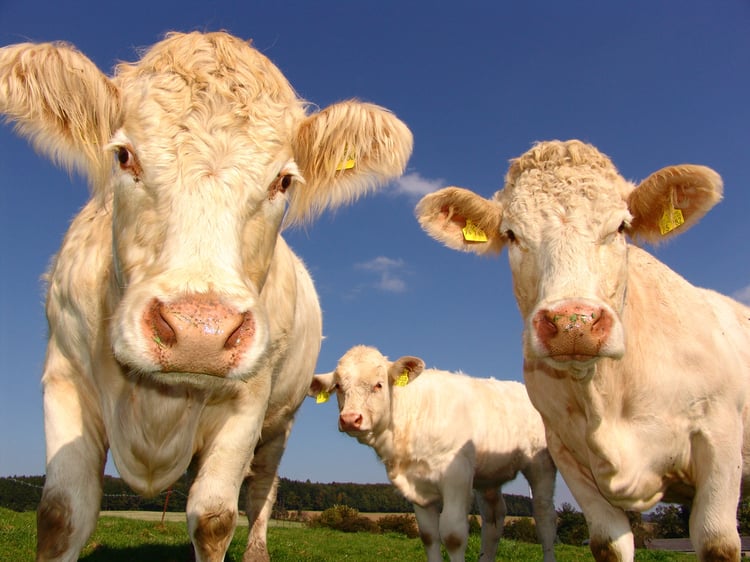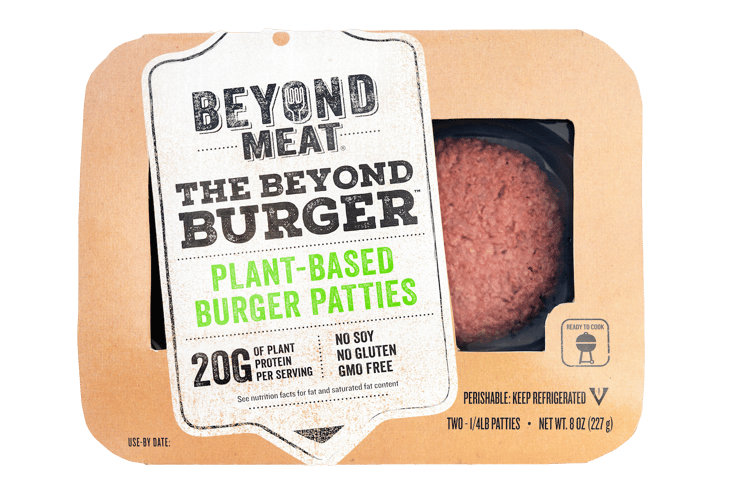The United States Cattlemen’s Association is charging at the makers of meatless burger patties with a Pamplona-like fury. The unlikely supplicants recently filed a 15-page petition with the USDA soliciting an official definition of “meat” and “beef” amidst a new crop of plant-based burgers—made most notably by Beyond Meat and Impossible Foods—that inch ever closer towards meat mimicry.
According to the association’s policy and outreach director, Lia Biondo, “While at this time alternative protein sources are not a direct threat to the beef industry, we do see improper labeling of these products as misleading. Our goal is to head off the problem before it becomes a larger issue.”
So, follow us through the grocery and food industry market research as we parse the meaning of meat, the different claimants to its definition, and ultimately what these debates mean about the future of meat consumption and, more broadly, the American diet.
The Better Burger Revolution Goes Green and Granola
The new wave of plant-based burgers is a bit different than generations past. Using cutting-edge lab techniques in high end R and D facilities, both Beyond Meat and Impossible Foods are creating plant-based burgers that bleed (beet juice), sear, can be cooked “rare,” and have the richness of animal meat (they use a close cousin of hemoglobin, derived from soy roots).
These products have some momentum, and not just among vegetarians. Indeed, Beyond Meat CEO Ethan Brown estimates that 70% of Beyond Meat’s consumers are not vegetarian, which makes sense considering vegans and vegetarians were never known to clamor for products that more closely mimic meat. The burgers are available in 450+ TGI Friday’s locations, and in national better burger joints like BurgerFi and BareBurgers.
Beyond that, Beyond Meat has secured $72 million in funding, which is less than ¼ of Impossible Foods’ VC war chest, and already counts Tyson, The Humane Society, and General Mills among its investors.
The Beef over Beef Consumption
Meat consumption is down. There’s just no other way to say it. Something like 60% of US consumers have reduced their meat consumption over the last several years, and 55% of those say the move is permanent.
These are the people keeping cattlemen awake at night. It’s not that the world is becoming more vegan (though that is also happening), it’s that typical Americans are reducing their meat consumption.
As we wrote last year in a food industry market research blog, “These are not the ‘vege-terrorists’ rocking ‘Meat is Murder’ bumper stickers, but rather typical Americans who, for financial, environmental, and even moral reasons, are choosing to limit their meat intake. Indeed, eating less meat has become increasingly normalized: Meatless Mondays actually are a thing, family barbeques seem to have at least one vegetarian option these days, and the days of eating meat with every meal seem a remnant of a different era.”
According to one research firm, if clean meat could capture just 5% of conventional meat’s market share, it would be a viable product, and we may be well on the way.
Who is Misleading Whom? And Does Oprah Know?
So it is against this backdrop that cattlemen, already known as a litigious bunch (ask Oprah!) have petitioned the government for clearer definitions of their core products. Cynics will suggest cattleman’s concerns about labels “misleading” customers are in fact misleading—the move appears to be entirely about disrupting mock-meat’s momentum in a moment when up to 60% of consumers are reducing their meat consumption.
Ultimately, their petition and broader stance feel like facing down an avalanche with a blow dryer—no amount of hot air can change facts on the ground.
Indeed, given his company’s ascendance and cattlemen’s panic, Beyond Meat’s CEO, Ethan Brown, is not worried. “I think it actually could help us more than it could hurt us because it starts the national dialogue around what really is meat, and the origin of meat really matters to the consumer.”

The Real Enemy is Americans’ Changing Diets
Jessica Almy, policy director at the Good Food Institute, finds the move a bit churlish and cowardly, something akin to hiding from the competition behind a legal brief: “We think that the cattlemen could face their competition head on…But rather than do that, they’re petitioning the USDA to police the use of certain terms on labels and skew the playing field in the cattleman’s favor.”
Forbes, long a parser of corporate double speak, agrees with her analysis, noting, “the [cattlemen’s] real motivation is fear.”
And industry and legal experts alike do not believe the move will ultimately be fruitful. Consider that the dairy industry has long lobbied against the extension of “milk” and “cheese” to non-dairy industries, a losing battle it has been waging for over 20 years. Sure, truth is on their side—soymilk is soy juice, plain and simple—but the USDA loathes to encroach upon free speech absent compelling evidence of quackery or charlatanism. Here, neither seems to apply.
Indeed, it is not like Bernice and Martin are going to the local grocery store and accidentally buying a plant-based burger, only to return home and discover their error (“Good God, Martin, there’s no cows in this beef!”).
Also, consider that, by the strictest definitions (OED and Webster), the word “meat” is not animal exclusive—it refers to the fleshy edible parts of plants as well, as with coconuts, corn, and sunflowers.
Clean Meat, Plant-Based Meat…Whatever Happened to Simple Veggie Burgers?
In time past, veggie burgers were roughly broken into two categories: those made of protein isolate attempting to mimic (though never come close to achieving) the texture and taste of a real burger, and those made of vegetables and starches meant to fill the burger void without resembling a burger beyond a circular shape.
Both types, in today’s expanded parlance, would fall into the “plant-based burger” category, which encompasses anything derived from plants served on burger buns. Sales in this category are expected to reach $5.2 billion over the next two years. This is where the familiar boca and garden burgers fit, as well as the newest iterations from Beyond Meat and Impossible Foods, which bleed, sear, and crisp like cow meat.

And then there are the promised “clean meat” burger varieties on the horizon—burgers made from lab-grown meat that utilizes a small amount of animal stem cells, reducing environmental and animal welfare concerns. Much like the Prince Who Was Promised, nobody knows entirely what this burger will look or taste like, just that it is coming. It is the subject of an arms race between Impossible Foods and Beyond Meat, and likely the ultimate target of the Cattleman’s beef.
Pigs, Chickens, and Forward Thinkers
Thus far, the National Pork Producers aren’t mucking it up, and the National Chicken Council aren’t running scared—neither organization has made similar moves to combat plant-based sausage or chick’n cutlets. Of course, faux pork and poultry have not drawn the same enthusiasm as the meatless burger, so it could only be a matter of time. But if the cattlemen come off as petulant luddites, you can expect the NPP and NCC to learn from their mistake.
Some meat producers are even running towards the challenge, not away from it, however. Tyson, the world’s largest chicken producer, already owns a 5% stake (not steak) in Beyond Meat, and is reportedly looking to increase it, and Cargill has similar investments.
Yet when it comes to fake cow meat, there remains much beef. The National Cattleman’s Beef Association, another industry lobby group, similarly took aim at the alternative meats of the world, listing “fake meat” as one of their main 2018 priorities, promising to “protect our industry and consumers from fake meat and misleading labels.’
Veggie Burgers that Bleed Cattleman’s Profits?
Obviously, plant-based burgers could only increase their market and mind share with some food and grocery industry market research. While people often think of focus groups as the beginning and end of taste tests—for good reason, they work!—customer intercepts are an ideal marriage of market research and collateral publicity. Positioning Field Agents in restaurants and grocery stores giving customers the opportunity to try a new product will give you good data on how people feel about it, while also drumming up enthusiasm among shoppers and diners.
Of course, it has to taste good, and thus far opinion is divided on the matter. Panel Surveys are an excellent market research methodology to suss out a formula’s successes and failures.
Regardless, Almy, for one, thinks this trend isn’t going anywhere but up: “Clean meat and plant-based meat will make up the majority of meat purchases by 2050. This is just the beginning of a very, very big trend in the food industry.”
Plant-Based and Clean Meat Burgers are a real threat to cattlemen, and if you prick them, they do indeed bleed.

